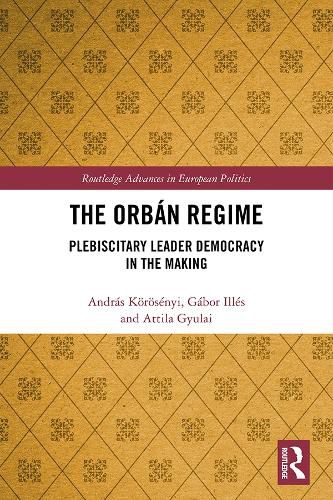Readings Newsletter
Become a Readings Member to make your shopping experience even easier.
Sign in or sign up for free!
You’re not far away from qualifying for FREE standard shipping within Australia
You’ve qualified for FREE standard shipping within Australia
The cart is loading…






This book gives the first comprehensive and theoretically substantiated political science account of the Orban regime in English.
It argues that Viktor Orban’s regime-building and reconstructive leadership is more than just an example of hybridisation, a successful populist appeal or a backlash against the earlier neoliberal hegemony in Central Europe. It unfolds the major traits of the Orban regime and argues that it provides a paradigmatic case of the Weberian model of plebiscitary leader democracy (PLD). Beyond explaining the backslide of liberal democracy in Hungary, the book aims at two additional contributions of wider significance. First, by applying the concept of PLD to the Hungarian case, it reveals that the authoritarian elements are products of an endogenous drive of modern mass democracy. Second, through the glass of PLD, the Orban regime can be seen as an experimental lab of global trends like mediatisation and personalisation of politics, populist style, the deconsolidation of liberal democratic order, and what is often labelled as post-truth politics .
This book will be of key interest both to scholars and students of Hungary, Post-communist and Central and East European politics and to those interested in populism, democratisation and democratic deconsolidation as a broader trend in a variety of countries.
$9.00 standard shipping within Australia
FREE standard shipping within Australia for orders over $100.00
Express & International shipping calculated at checkout
This book gives the first comprehensive and theoretically substantiated political science account of the Orban regime in English.
It argues that Viktor Orban’s regime-building and reconstructive leadership is more than just an example of hybridisation, a successful populist appeal or a backlash against the earlier neoliberal hegemony in Central Europe. It unfolds the major traits of the Orban regime and argues that it provides a paradigmatic case of the Weberian model of plebiscitary leader democracy (PLD). Beyond explaining the backslide of liberal democracy in Hungary, the book aims at two additional contributions of wider significance. First, by applying the concept of PLD to the Hungarian case, it reveals that the authoritarian elements are products of an endogenous drive of modern mass democracy. Second, through the glass of PLD, the Orban regime can be seen as an experimental lab of global trends like mediatisation and personalisation of politics, populist style, the deconsolidation of liberal democratic order, and what is often labelled as post-truth politics .
This book will be of key interest both to scholars and students of Hungary, Post-communist and Central and East European politics and to those interested in populism, democratisation and democratic deconsolidation as a broader trend in a variety of countries.